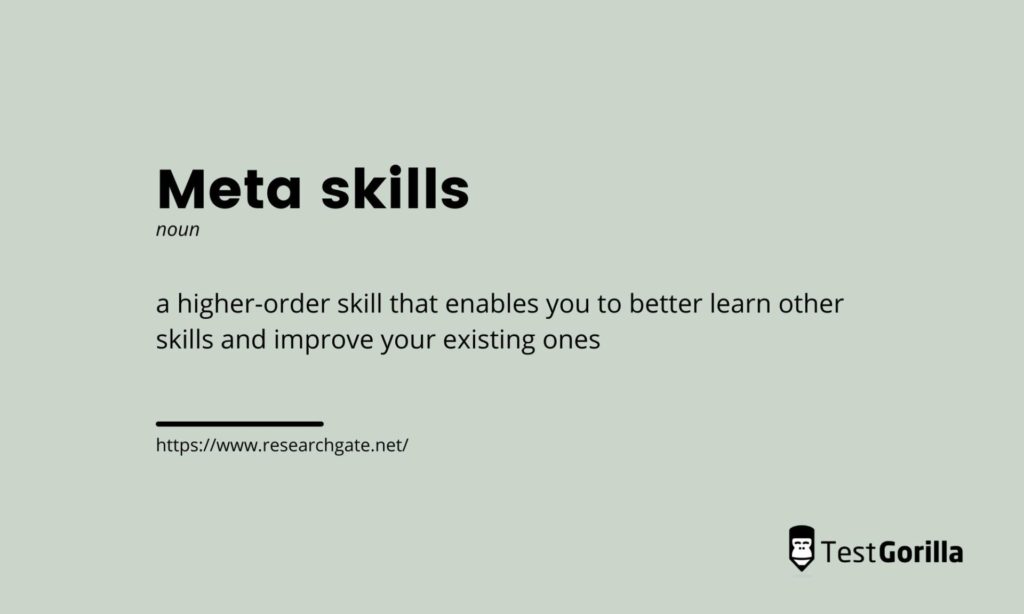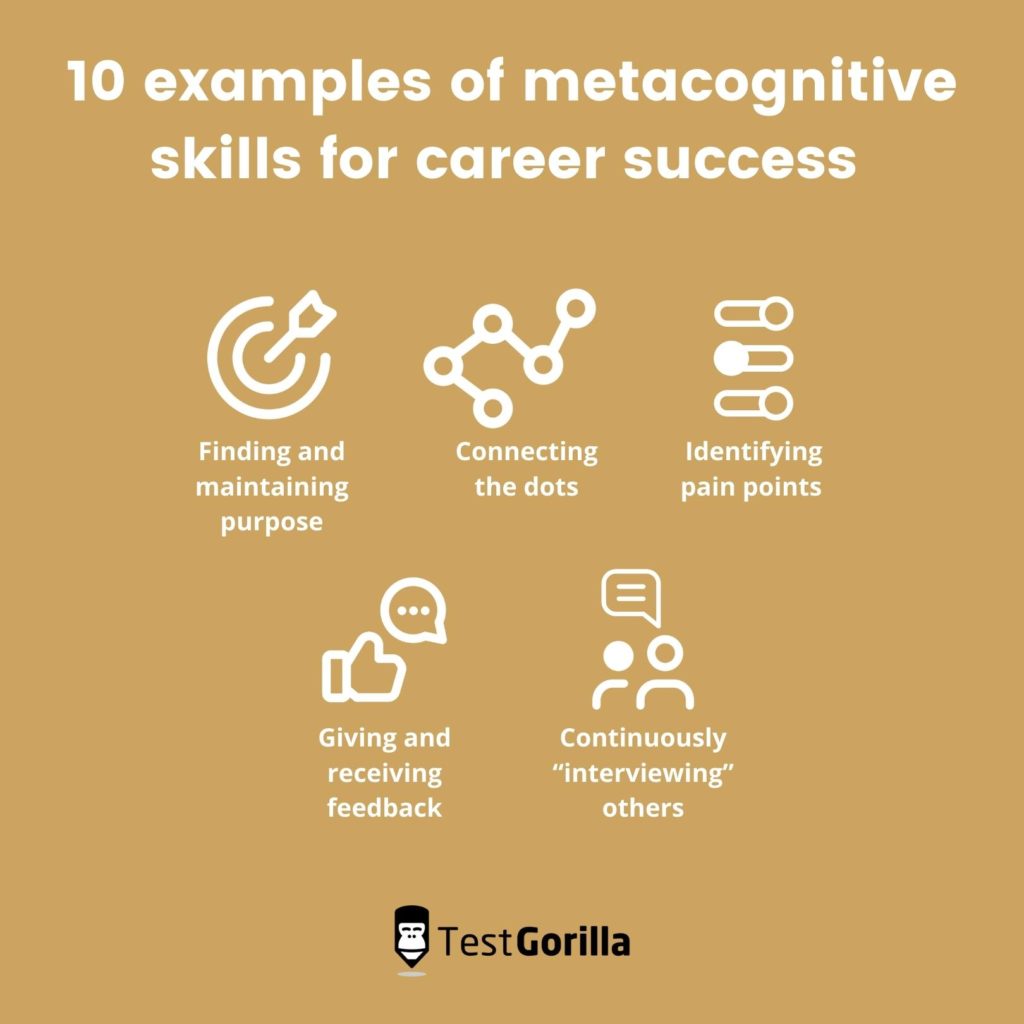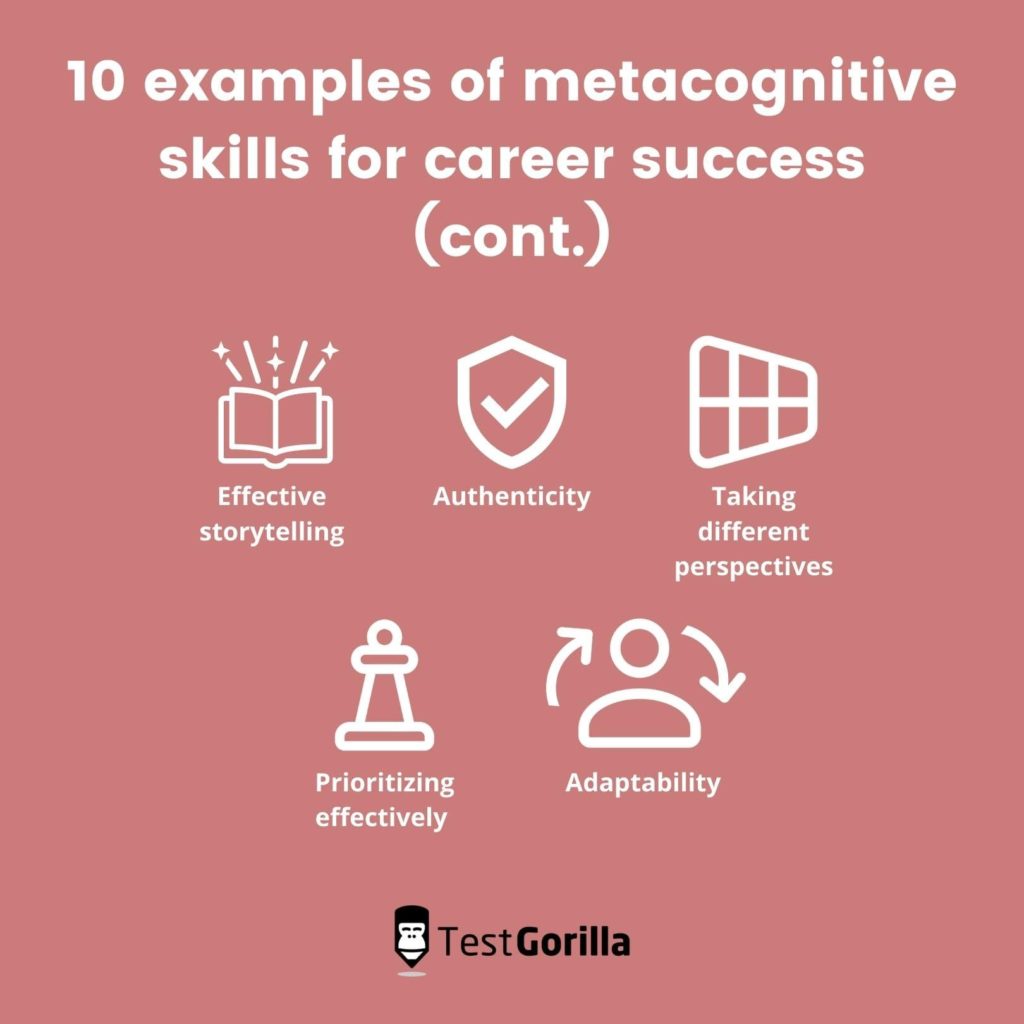Upskilling and reskilling have always been important activities for employers.
After all, investing in employees’ learning and development is key to improving employee retention, performance, and engagement.
However, investing in your own upskilling and reskilling is vital for standing out in a fast-paced labor market with ever-changing essential skills.
Meta skills, also known as meta abilities or meta competencies, are cognitive skills that translate across projects, roles, and industries. These skills are growing in popularity as a critical factor in candidates’ success.
In this guide, we take a look at what meta skills are, why they’re essential for thriving in your career, and why you should prioritize cultivating your meta skills for future job success.
What is a meta skill?
According to research commissioned by the government agency Skills Development Scotland, a meta skill is a “higher-order” skill that enables you to better learn other skills and improve your existing ones.
Essentially, meta skills are the foundation for developing, cultivating, and executing other skills.
For example, although the ability to communicate in Spanish can be considered a specific skill, knowing how to develop the skills to learn any language is considered a meta skill.
Meta skills are intended to cultivate a growth mindset that enables individuals to prepare themselves for lifelong learning to develop new competencies in an ever-changing work environment.
There are many kinds of meta skills, including the ability to take different perspectives within various scenarios, identify pain points, and engage in impactful storytelling.
Meta skills vs. soft skills
Many meta skills appear similar to soft skills.
However, whereas soft skills tend to be interpersonal skills that you can adapt within different environments and around different people, meta skills are permanent.
Meta skills foster an ongoing enthusiasm for and commitment to lifelong learning and serve as the basis for knowing how to learn new skills.
The best insights on HR and recruitment, delivered to your inbox.
Biweekly updates. No spam. Unsubscribe any time.
Why meta skills are essential for helping you thrive in your career
Refining your skill set amplifies your employment and career development opportunities and helps you stand out from a crowd of worthy applicants.
Although the number of open roles requiring stronger cognitive skills has been steadily increasing, 80% of chief executive officers believe that their biggest business challenge is acquiring new employee skills.
Since they lay the foundation for how skills are learned, meta skills play a crucial role in helping you achieve your career goals.
Acquiring skills gives you a competitive advantage, and business leaders are actively looking for candidates who can give their companies an edge.
As the corporate world enters a tentative “post-pandemic” transformation alongside the rise in automation and new workforce models, business leaders are seeking out candidates with exceptional adaptability and resilience – both of which are key meta skills.
According to McKinsey & Company, adaptability is the most important skill an employee can have to thrive in the volatile, uncertain, complex, and ambiguous (VUCA) environment that defines the current economy.
10 examples of metacognitive skills for career success
The concept of meta and metacognitive skills is relatively new.
However, several skills fall under the meta skill umbrella.
Below, we go through 10 of the most important meta skills that can help you bolster your future career plans.
1. Finding and maintaining purpose
Rather than something that’s fixed, purpose is, in fact, a meta skill.
It’s important to develop the ability to find and maintain purpose at work and in your role, especially if you have leadership ambitions.
Though the principal focus might change over time, maintaining a strong sense of personal purpose helps you make hard decisions, positively influence the impact of your colleagues’ contributions, and drive change and innovation.
Business leaders are eager to hire those with a strong sense of purpose.
Individuals who display and connect with a deep sense of purpose make great leaders since they’re able to align with their organization’s purpose and objectives and influence their teams and stakeholders.
2. “Connecting the dots”
Connecting the dots is a meta ability that involves bridging multiple facts and ideas to see the whole picture.
Individuals who can connect the dots are not only able to see the forest for the trees but can also determine how smaller, seemingly unrelated pieces of information contribute to the bigger picture.
The ability to draw logical connections between both facts and disparate pieces of information and arrive at a solution, as well as assess how smaller actions may impact outcomes, are a key metacognitive skill for today’s workforce.
3. Identifying pain points
Efficiently identifying pain points is another essential meta skill that shows your aptitude for understanding underlying problems and where your actions can make the biggest impact.
Individuals with this meta skill can uncover pain points by asking the right people the right questions, acknowledging that there is no one-size-fits-all solution, and using solid communication skills like active listening to draw out the necessary information.
4. Giving and receiving feedback
The ability to give, receive, and solicit constructive feedback is an important communication meta skill.
This skill is necessary for almost all roles across many industries. In fact, giving and receiving feedback can be considered one of the most significant meta skills since it promotes learning and growth, which are key to innovative workplace cultures.
Individuals who are competent in giving and receiving feedback can separate their personal feelings from feedback, translate feedback into actionable advice, and view the feedback process as an opportunity to realign goals, objectives, and measurable actions.
5. Continuously “interviewing” others
Interviewing doesn’t just refer to the process of assessing candidates for open roles. In fact, not every position will require you to perform job interviews.
However, individuals with this meta skill are actually “interviewing” others on a continuous basis.
Effective and active listening, empathy, and open-mindedness are key characteristics of people with this skill and enable them to listen to and understand customers, clients, and colleagues.
Essentially, the ability to interview depends on a range of situational judgment skills, including thinking strategically, bringing innovative solutions to the table, influencing others, employing emotional intelligence, and negotiating effectively in business contexts.
6. Effective storytelling
Great storytellers can change the way people think and act. If you have effective storytelling abilities, you can capture your audience’s attention, keep them rapt, and prompt them to make decisions based on the story you’ve told.
Far from being a skill only needed by salespeople, effective storytelling helps you connect with a wide range of people from different backgrounds, empathize with others, understand why they take the actions they do, and shape their opinions.
In a business context, storytelling connects customers with your company brand. Customers aren’t interested in your business objectives, but they do care about how you can solve their problems.
Being able to frame your company’s expertise as the best (or only) solution for their pain points is a core benefit of developing effective storytelling skills.
7. Authenticity
You’re probably asking how being yourself is something you can learn to do. However, our ability to be our authentic selves is often challenged in the workplace.
Learning how to always be true to yourself, your values, and your goals regardless of external pressures not only helps others understand you better but also has far-reaching benefits for your future career prospects.
When you’re honest with yourself and others, you are more likely to take responsibility for your judgments, decisions, and mistakes since you’re acting on your true thoughts and beliefs. This also means that you can feel like you’re missing out on opportunities at times.
For example, when you learn to always be authentic, you may decide to turn down an otherwise exciting job offer if the company’s values don’t align with your own.
In the long run, however, authenticity gives you the confidence to recognize opportunities that allow you to be your genuine self.
8. Taking different perspectives
Those who can take a variety of perspectives are able to step outside of their own frames of reference and into another’s shoes to see their point of view.
Perspective-taking is the cognitive act of seeing a situation from another’s vantage point.
It enables you to pay attention to others’ interests and priorities as well as your own, which facilitates problem-solving processes, reduces misunderstandings, and improves outcomes.
By taking other perspectives to ascertain what drives customers and colleagues, you can also assess situations more carefully and resolve conflicts.
9. Prioritizing effectively
Developing the ability to prioritize effectively is an invaluable meta ability.
Those who develop this skill understand that prioritization does not mean “working smarter, not harder” but instead seeing the full scope of what needs to be achieved by keeping future outcomes in the front of their mind.
With effective prioritization, you can drive value with every task you take on (even the most mundane ones) and arrange tasks in a hierarchical sequence that enables you to accomplish long-term goals and results efficiently.
10. Adaptability
Over the past few years, adaptability has often topped the list of business leaders’ desired employee skills.
Adaptability is an evergreen meta skill that enables individuals to handle unexpected situations with minimal guidance. It refers to the ability to quickly adjust to new conditions and remain productive during periods of change or upheaval.
An individual’s adaptability is fueled by three other distinctive skills that we explore below.
Self-awareness
Self-awareness is the ability to recognize and monitor your own emotions and reactions in different circumstances. It also includes accepting your strengths and weaknesses and recognizing your abilities.
Individuals with high levels of self-awareness can manage their emotions to avoid negative consequences and likely have high levels of self-esteem.
This means that they’re able to trust themselves to make the right decisions in high-pressure situations and avoid and alleviate conflict with others.
Creativity
Creativity is more than just bringing new and unique ideas to the table. It also involves finding innovative ways to solve both old and new problems without injecting your personal emotions into the process.
Creative people can understand the challenges at hand by analyzing all relevant aspects. From there, they can generate ideas, identify potential obstacles, and put appropriate plans into action.
Finally, they’re able to objectively observe, monitor, and adjust plans and processes to secure the best outcomes.
Resilience
Your level of adaptability is determined by how resilient you are.
Not only do resilient people have the emotional capacity to recover, adapt, and power through uncomfortable and difficult situations with ease, but they can also resist allowing their personal feelings to affect them.
Furthermore, they’re able to readily provide encouragement and support to others and cope well when having to produce solutions on the spot.
Why you should prioritize cultivating your meta skills
Meta skills are important tools that provide us with a blueprint to learn all other skills.
For example, if you want to relocate and learn a language to improve your chances of landing a job in a new country, meta skills can provide the foundation you need to achieve this.
Let’s see how each of the meta skills we’ve covered could help you succeed in this specific scenario.
Finding and maintaining purpose: This meta skill could enable you to identify and stay focused on how learning the language will bring you closer to achieving your future goals, helping you persevere even when you face difficulties.
“Connecting the dots”: Rather than only focusing on the fact that learning a language will make it easier to find a job, you can use this meta skill to realize that it will also help you integrate with other colleagues in a new culture and workplace.
Identifying pain points: Learning a language always comes with challenges, but this meta skill enables you to identify tangible pain points you might face. These could include finding time to dedicate to language learning or a partner to practice with. Once you’ve recognized these potential roadblocks, you can implement solutions for them in advance.
Giving and receiving feedback: Everyone has their preferred way of learning, but this meta skill could help you recognize that you may need to broaden your learning methods or increase the amount of time you dedicate to the language. It could also give you the confidence to make mistakes or give feedback to your tutors on their teaching methods and how they could better support you.
Continuously “interviewing” others: Effective and active listening and open-mindedness are key to language learning. When practicing the language, you might find it difficult to have fluid conversations with new people. This meta skill could help you assess others and hold discussions even in a different language.
Effective storytelling: If you want to move past conversations about your family and what you do for a living, this meta skill could enable you to shape the way you learn, practice, and interact with native speakers.
Authenticity: It can often be challenging to be yourself when speaking a different language. However, if you have high levels of self-acceptance, it’s more likely you’ll be able to carry your personality and values through to another language.
Taking different perspectives: Learning a language can often put you in unfamiliar situations with different people from varied backgrounds. In such a situation, keeping an open mind and seeing the world through another’s eyes is an important meta skill.
Prioritizing effectively: Often, learning a language needs to fit in around many other competing priorities. Aligning your priorities with your future goals and desired outcomes will help you prioritize language learning effectively.
Adaptability (including self-awareness, creativity, and resilience): When you’re learning a new language, you can often find yourself in unfamiliar situations and challenging conversations. Adaptability, resilience, and creativity are the backbone of being able to stick it out even when the going gets tough.
As you can see, meta skills are not only the cornerstone of learning new skills, but they also help you put them to use in daily life.
Additionally, they cultivate a growth mindset and remove your resistance to challenging situations, which gives you a competitive edge in a large, talented labor pool.
Final recommendations for honing your meta skills
Meta abilities are lifelong skills, and developing them takes time and dedication.
Although some of us already possess many of these meta skills as innate personality traits, others need careful cultivation.
If you’re ready to start developing your meta skills, begin by applying them to skills that you’d like to learn or are currently developing.
To get you started, we’ve put together a list of TestGorilla’s resources on role-specific skills in different industries:
You've scrolled this far
Why not try TestGorilla for free, and see what happens when you put skills first.





















